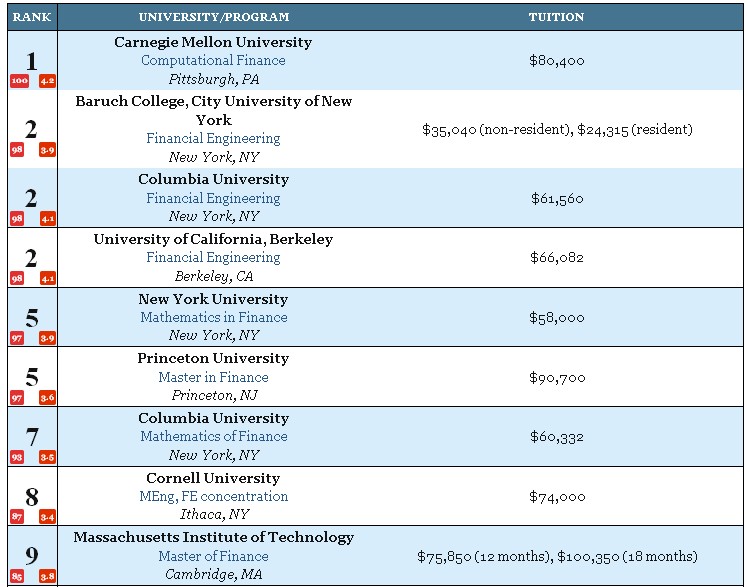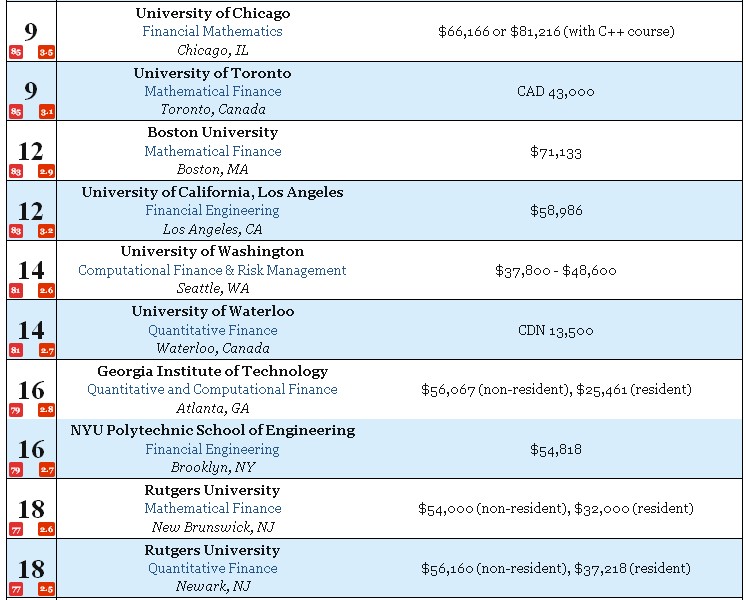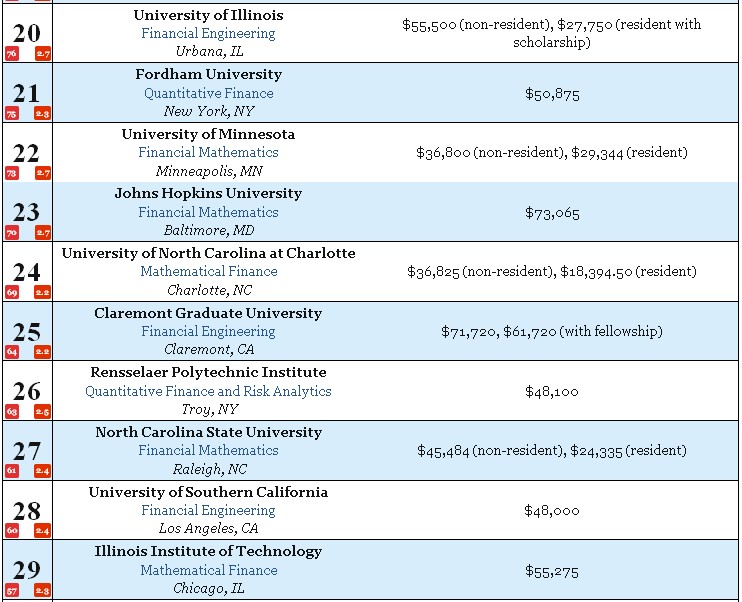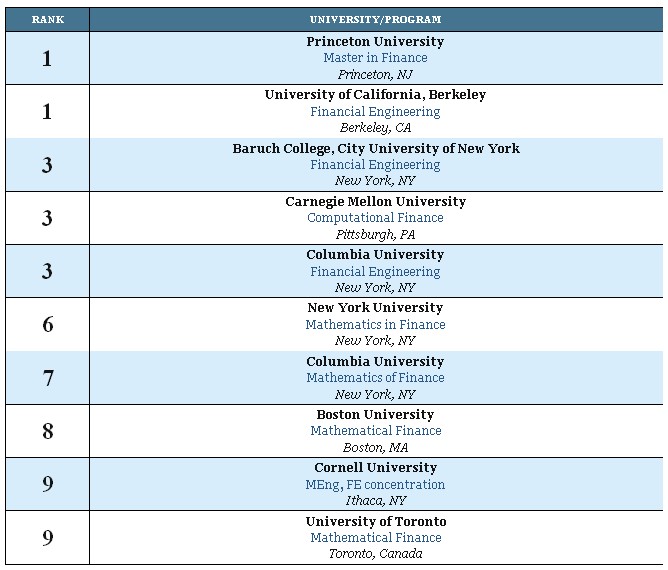东南大学Zhao同学
普林斯顿大学机械工程博士全奖
美国金融工程专业选校 先读懂这三大排名
发布时间:2016年02月25日 来源:毕达留学
毕达留学是一家以“录名校、做口碑”为理念的留学咨询机构,专注本科、硕士和博士等各阶段的海外名校申请。毕达注重个性化和透明化的申请服务,致力于申请者学术和职业素养的提升,帮助申请者从本质上提升竞争力并获名校录取。众多超预期的名校录取,是毕达打造以口碑传播为核心的基础。正因如此,每年都有众多学生以照片和视频形式为毕达留学公开代言。查看更多
美国大学的金融工程专业是所有专业中最难申请的一门,尤其是开设这个专业的学校本身数量就不是很多的情况下,竞争更为激烈。我相信,某个层面来说,金融工程算得上是金融界的食物链顶端了。
使得我们对金融工程趋之若鹜的原因是什么呢?看看他们怎么说:
华尔街经济分析师(毕业于Tufts经济学硕士):在美国金融界,最吃香的是数量金融/计量金融/数学金融/金融工程(以下统一称为金工)。
华尔街摩根大通量化分析师(毕业于哥大金工硕士):现在来说,理工科包括金融工程类专业就业较好,一方面是市场需求充足,另一方面是29OPT可以让一部分企业第一年不用帮学生办H1B工作签证,增加了竞争力。
不少毕达学子也向小编反映过:纯金融留美就业非常难,金工在美国金融界是最吃香的。
没错!今天小编为大家剖析的专业就是——金融工程,什么样的背景适合申请金工呢?在此,小编给大家一点建议:
金工硕士的全部课程均围绕金融学的应用展开,具有实用性很强的特点,并且是极具职业导向的,目标是培养具有相当强的计算机和数学素质,同时具有管理和商务技巧的专业人士,使他们可以在投资银行、商业银行、对冲基金、保险公司、公司财务部门等,从事证券金融衍生产品估价,投资组合管理,风险管理和市场预测等工作。
基于学习与培养目标,并纵观往年金工的顶级录取,毕达建议大家在判断自身是否能够申请金融工程,或者判断申请成功率时,以往修过的数理课程和计算机课程的数量是一个非常重要的参考标准。
接下来,如何选择金工项目呢?看看一些在读校友是如何评价的:
华尔街摩根大通量化分析师(毕业于哥大金工):哥大优势主要有几点,首先学校名气大,华尔街内校友非常多。其次学校在纽约,无论是面试,还是社交都非常方便,第三,金融数学就业比较好,而且OPT时长29个月,非常有优势。
我们项目同学就业情况很好,这也跟美国经济状况有关。同学在各大投行,基金都就业了,基本是想要留下的都能留下。
Gatech金工在读校友:我在留学期间,已经获到了德意志银行的实习,是在一个asset wealth management group里负责量化交易方面的工作,这个职位全球只招一人。我在读项目的学生毕业分散全美各地。大部分去商业银行或者四大做risk management(credit risk modeling, model validation, risk consulting),有部分去做投行,少部分去做trader。未来发展会很好,系主任很用心。
项目在读的中国学生就业都不错,full time基本保证100%。有一两个回国的,基本都是有资源的,回国有起薪40w rmb+huge bonus的,有拿了华夏基金和工行中行offer的。就算没有找到intern 或者intern在国内做的,也都能找到full time。工作不要担心,只要用心去找。有去读金融学phd的。
Rutgers金工在读校友:教授大多有街上(华尔街)背景。本届40多学生,中国人和外国人一半。本届目前暑假留在美国实习的大概一半中国人。上一届找工作情况总体乐观。当然还有继续申请PhD的。
小编当然不是为了安利大家项目(虽然他们都是很好的金工项目),在此只是为了告诉大家,选择项目很重要!关键因素无非是,学校名气、项目质量、就业情况与优势(包括校友资源、就业服务、地理位置)、录取难度(student profile)。
USNEWS并没有金融工程专业的排名,目前关于MFE(金工硕士)的主流排名有以下三个:
QuantNet
Quantnet排名是学生最常参考的MFE排名,每两年更新一次,以美国新闻与世界报道的Business School Rankings Methodology为基础的算法进行排名。由Baruch的校友在运营,所以,有些信息存在偏向性。我们应该如何解读这份排名?
1、排名标准
同行评估 Peer Assessment Score (20%)
就业成功率 Placement Success (45%)
学生水平 Student selectivity (25%)
雇主评价 Employer Survey Score (10%)
这几项都是我们选择项目时的重要考虑因素,小编认为,就就业的角度,这还是一份很值得参考的排名。
2、2015年Quantnet北美MFE排名




另外,它家还专门除了一份TOP 10 MFE PROGRAMS WITH BEST EMPLOYMENT OUTCOMES排名,我们也来看看:

自诩做不到超级学霸的,大家可以参考申请难度稍低的Rutgers、BU、UIUC、RPI、NYU-Poly、IIT和Stevens。
Financial Engineer
《金融工程师》排名所列的项目是比较全的,它可以作为一个选校的项目列表,小编更建议大家根据个人的需求选择适合的项目。
1、排名标准
GRE分数:30% GRE Scores
平均起薪:25% Starting Salary and Bonus
本科GPA:15% Undergraduate GPA
录取率:15% Acceptance Rate
毕业时就业率:10% Full Time Graduates Employed at Graduation
毕业后三个月内就业率:5% Full Time Graduates Employed 3 Months after Graduation
2、2016 MFE Rankings
Top quant programs according to the street
这是一份由华尔街根据招聘记录,评选出了排名TOP10的金融工程学校,目前只更新至2012年。这也是一份非常具有参考价值。
1. Carnegie Mellon University
Degree: Master of Science in Computational Finance (M.S.C.F.)
2. Columbia University
Degree: Master of Science in Financial Engineering
3. Cornell University
Degree: Master of Engineering with Financial Engineering Concentration
4. Massachusetts Institute of Technology Sloan School of Business
Degree: Masters in Finance
5. New York University Courant Institute of Mathematical Sciences
Degree: Master of Science of Mathematics in Finance (M.S.M.F.)
6. Princeton University
Degree: Master in Finance
7. Rutgers University
Degrees: Rutgers offers two quant degrees: an M.S. in Quantitative Finance via the Business School and an M.S. in Mathematics with an Option in Mathematical Finance via the School of Arts and Sciences.
8. Stanford University
Degree: Master of Science in Financial Mathematics
9. University of California-Berkeley (Haas School of Business)
Degree: Master of Financial Engineering
10. University of Chicago
Degree: Master of Science of Financial Mathematics
PS:特别荣誉提名了Baruch。
使得我们对金融工程趋之若鹜的原因是什么呢?看看他们怎么说:
华尔街经济分析师(毕业于Tufts经济学硕士):在美国金融界,最吃香的是数量金融/计量金融/数学金融/金融工程(以下统一称为金工)。
华尔街摩根大通量化分析师(毕业于哥大金工硕士):现在来说,理工科包括金融工程类专业就业较好,一方面是市场需求充足,另一方面是29OPT可以让一部分企业第一年不用帮学生办H1B工作签证,增加了竞争力。
不少毕达学子也向小编反映过:纯金融留美就业非常难,金工在美国金融界是最吃香的。
没错!今天小编为大家剖析的专业就是——金融工程,什么样的背景适合申请金工呢?在此,小编给大家一点建议:
金工硕士的全部课程均围绕金融学的应用展开,具有实用性很强的特点,并且是极具职业导向的,目标是培养具有相当强的计算机和数学素质,同时具有管理和商务技巧的专业人士,使他们可以在投资银行、商业银行、对冲基金、保险公司、公司财务部门等,从事证券金融衍生产品估价,投资组合管理,风险管理和市场预测等工作。
基于学习与培养目标,并纵观往年金工的顶级录取,毕达建议大家在判断自身是否能够申请金融工程,或者判断申请成功率时,以往修过的数理课程和计算机课程的数量是一个非常重要的参考标准。
接下来,如何选择金工项目呢?看看一些在读校友是如何评价的:
华尔街摩根大通量化分析师(毕业于哥大金工):哥大优势主要有几点,首先学校名气大,华尔街内校友非常多。其次学校在纽约,无论是面试,还是社交都非常方便,第三,金融数学就业比较好,而且OPT时长29个月,非常有优势。
我们项目同学就业情况很好,这也跟美国经济状况有关。同学在各大投行,基金都就业了,基本是想要留下的都能留下。
Gatech金工在读校友:我在留学期间,已经获到了德意志银行的实习,是在一个asset wealth management group里负责量化交易方面的工作,这个职位全球只招一人。我在读项目的学生毕业分散全美各地。大部分去商业银行或者四大做risk management(credit risk modeling, model validation, risk consulting),有部分去做投行,少部分去做trader。未来发展会很好,系主任很用心。
项目在读的中国学生就业都不错,full time基本保证100%。有一两个回国的,基本都是有资源的,回国有起薪40w rmb+huge bonus的,有拿了华夏基金和工行中行offer的。就算没有找到intern 或者intern在国内做的,也都能找到full time。工作不要担心,只要用心去找。有去读金融学phd的。
Rutgers金工在读校友:教授大多有街上(华尔街)背景。本届40多学生,中国人和外国人一半。本届目前暑假留在美国实习的大概一半中国人。上一届找工作情况总体乐观。当然还有继续申请PhD的。
小编当然不是为了安利大家项目(虽然他们都是很好的金工项目),在此只是为了告诉大家,选择项目很重要!关键因素无非是,学校名气、项目质量、就业情况与优势(包括校友资源、就业服务、地理位置)、录取难度(student profile)。
USNEWS并没有金融工程专业的排名,目前关于MFE(金工硕士)的主流排名有以下三个:
QuantNet
Quantnet排名是学生最常参考的MFE排名,每两年更新一次,以美国新闻与世界报道的Business School Rankings Methodology为基础的算法进行排名。由Baruch的校友在运营,所以,有些信息存在偏向性。我们应该如何解读这份排名?
1、排名标准
同行评估 Peer Assessment Score (20%)
就业成功率 Placement Success (45%)
学生水平 Student selectivity (25%)
雇主评价 Employer Survey Score (10%)
这几项都是我们选择项目时的重要考虑因素,小编认为,就就业的角度,这还是一份很值得参考的排名。
2、2015年Quantnet北美MFE排名




另外,它家还专门除了一份TOP 10 MFE PROGRAMS WITH BEST EMPLOYMENT OUTCOMES排名,我们也来看看:

自诩做不到超级学霸的,大家可以参考申请难度稍低的Rutgers、BU、UIUC、RPI、NYU-Poly、IIT和Stevens。
Financial Engineer
《金融工程师》排名所列的项目是比较全的,它可以作为一个选校的项目列表,小编更建议大家根据个人的需求选择适合的项目。
1、排名标准
GRE分数:30% GRE Scores
平均起薪:25% Starting Salary and Bonus
本科GPA:15% Undergraduate GPA
录取率:15% Acceptance Rate
毕业时就业率:10% Full Time Graduates Employed at Graduation
毕业后三个月内就业率:5% Full Time Graduates Employed 3 Months after Graduation
2、2016 MFE Rankings
| Rank | University | Program |
| 1 | Columbia University | Financial Engineering |
| 2 | University of California - Berkeley | Financial Engineering |
| 3 | Cornell University | Financial Engineering |
| 4 | New York University | Financial Mathematics |
| 5 | Carnegie Mellon University | Computational Finance |
| 6 | University of Chicago | Financial Mathematics |
| 7 | University of Illinois | Financial Engineering |
| 8 | Johns Hopkins University | Financial Engineering |
| 9 | Georgia Institute of Technology | Quantitative & Computational Finance |
| 10 | Stanford University | Computational and Mathematical Engineering |
| 11 | NYU Tandon School of Engineering | Financial Engineering |
| 12 | Rensselaer Polytechnic Institute | Quantitative Finance and Risk Analytics |
| 13 | Stevens Institute of Technology | Financial Engineering |
| 14 | University of California - Los Angeles | Financial Engineering |
| 15 | University of Notre Dame | Computational Finance |
| 16 | University of Southern California | Financial Engineering |
| 17 | Illinois Institute of Technology | Mathematical Finance |
| 18 | Claremont Graduate University | Financial Engineering |
| 19 | Baruch College | Financial Engineering |
| 20 | University of North Carolina - Charlotte | Mathematical Finance |
| 21 | Rutgers University | Mathematical Finance |
| 22 | University of Minnesota | Financial Mathematics |
| 23 | North Carolina State University | Financial Mathematics |
| 24 | Boston University | Mathematical Finance |
| 25 | Fordham University | Quantitative Finance |
| 26 | Georgia State University | Mathematical Risk Management |
| 27 | University of Connecticut | Applied Financial Mathematics |
| 28 | Florida State University | Financial Mathematics |
| 29 | Rochester Institute of Technology | Computational Finance |
| 30 | DePaul University | Computational Finance |
| 31 | Worcester Polytechnic Institute | Financial Mathematics |
| 32 | Lehigh University | Analytical Finance |
| 33 | University of Washington | Computational Finance and Risk Management |
| 34 | Stony Brook University | Quantitative Finance |
| 35 | Hofstra University | Quantitative Finance |
| 36 | New Jersey Institute of Technology | Mathematical and Computational Finance |
| 37 | Texas A&M University | Financial Mathematics |
| 38 | Temple University | Financial Engineering |
| 39 | Oklahoma State University | Quantitative Financial Economics |
| 40 | Purdue University | Computational Finance |
| 41 | University of Michigan | Quantitative Finance & Risk Management |
| 42 | University at Buffalo | Quantitative Finance |
| 43 | Washington State University | Computational Finance |
| 44 | University of Dayton | Financial Mathematics |
| 45 | University of Texas at Arlington | Quantitative Finance |
| 46 | Bradley University | Quantitative Finance |
Top quant programs according to the street
这是一份由华尔街根据招聘记录,评选出了排名TOP10的金融工程学校,目前只更新至2012年。这也是一份非常具有参考价值。
1. Carnegie Mellon University
Degree: Master of Science in Computational Finance (M.S.C.F.)
2. Columbia University
Degree: Master of Science in Financial Engineering
3. Cornell University
Degree: Master of Engineering with Financial Engineering Concentration
4. Massachusetts Institute of Technology Sloan School of Business
Degree: Masters in Finance
5. New York University Courant Institute of Mathematical Sciences
Degree: Master of Science of Mathematics in Finance (M.S.M.F.)
6. Princeton University
Degree: Master in Finance
7. Rutgers University
Degrees: Rutgers offers two quant degrees: an M.S. in Quantitative Finance via the Business School and an M.S. in Mathematics with an Option in Mathematical Finance via the School of Arts and Sciences.
8. Stanford University
Degree: Master of Science in Financial Mathematics
9. University of California-Berkeley (Haas School of Business)
Degree: Master of Financial Engineering
10. University of Chicago
Degree: Master of Science of Financial Mathematics
PS:特别荣誉提名了Baruch。

























